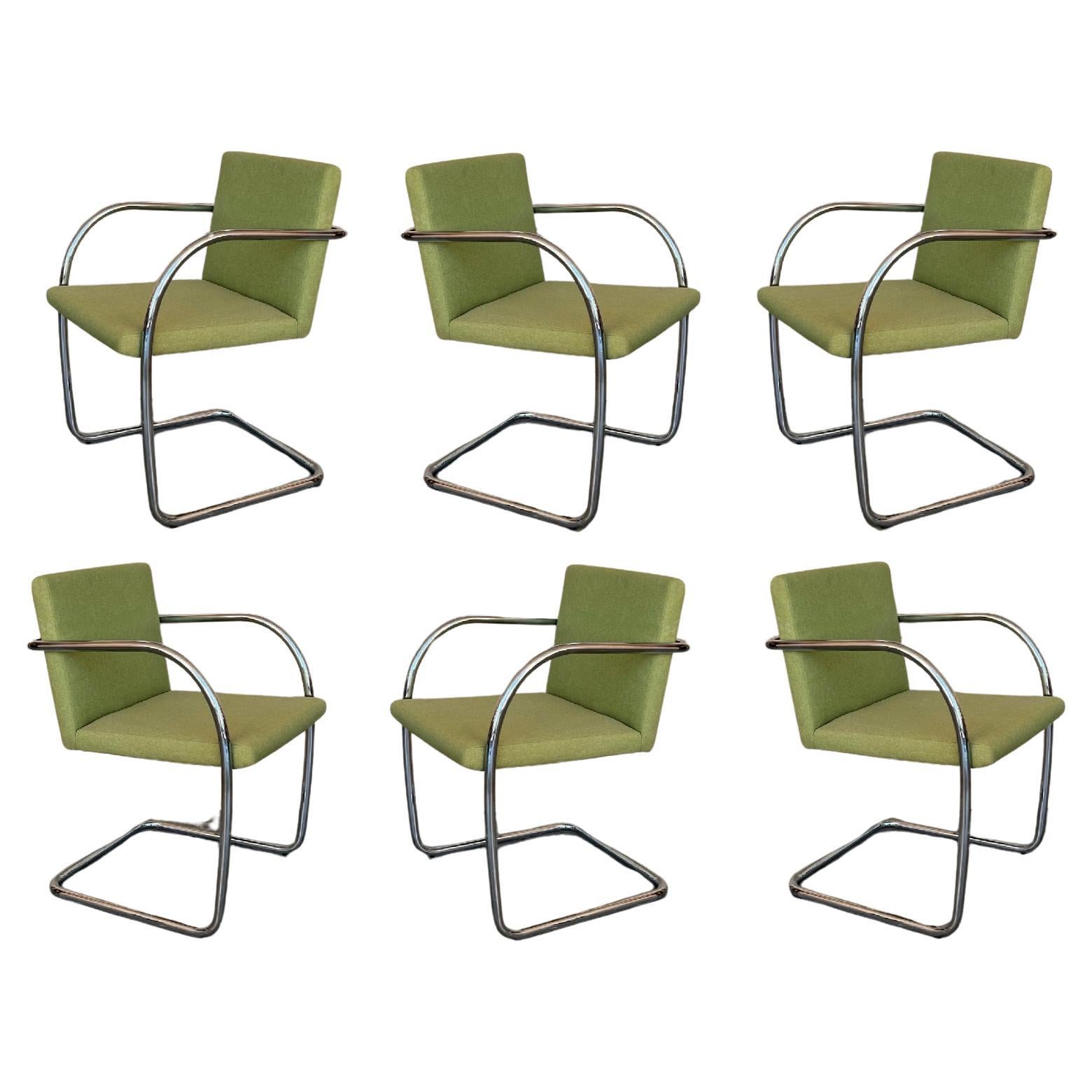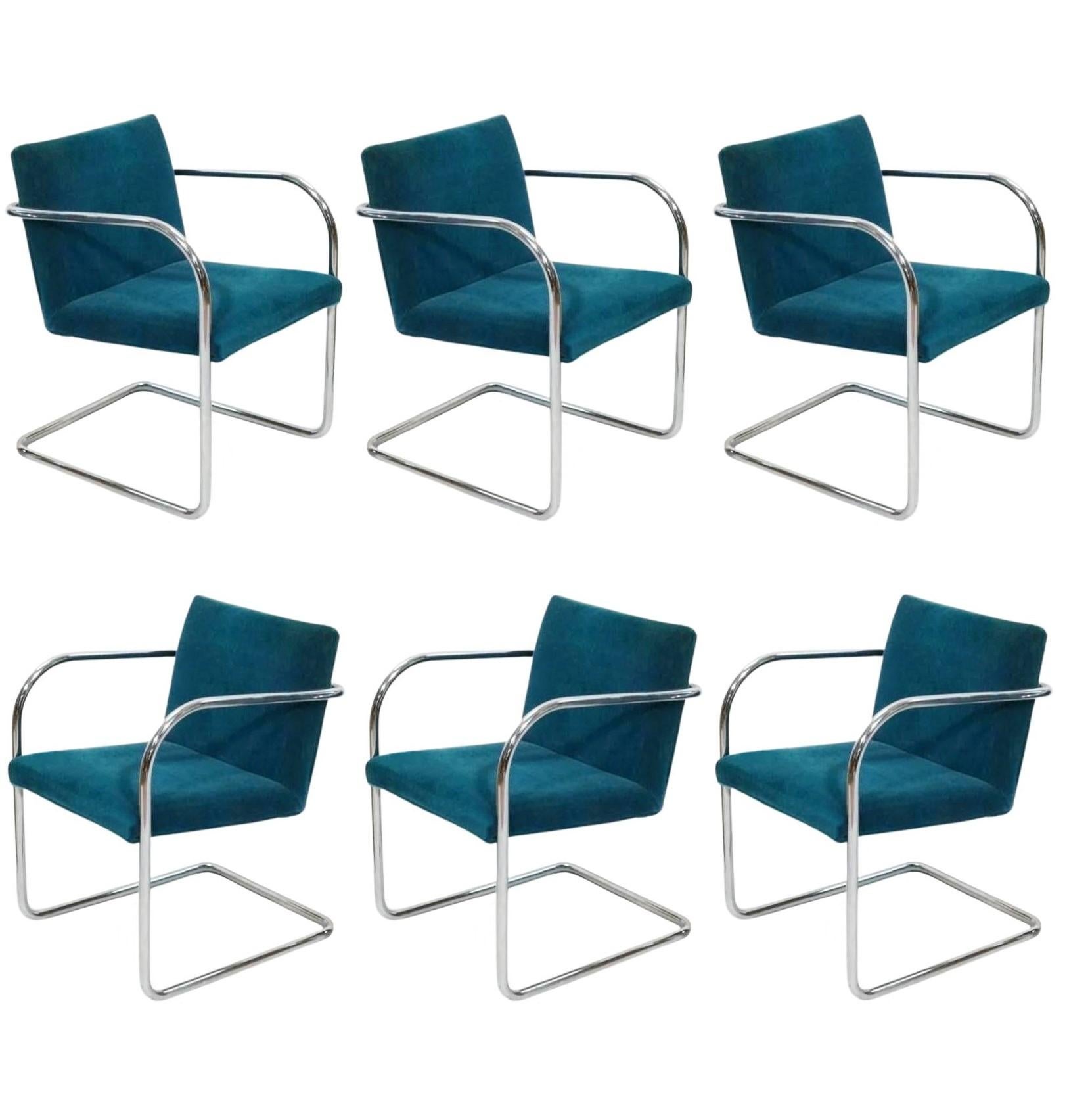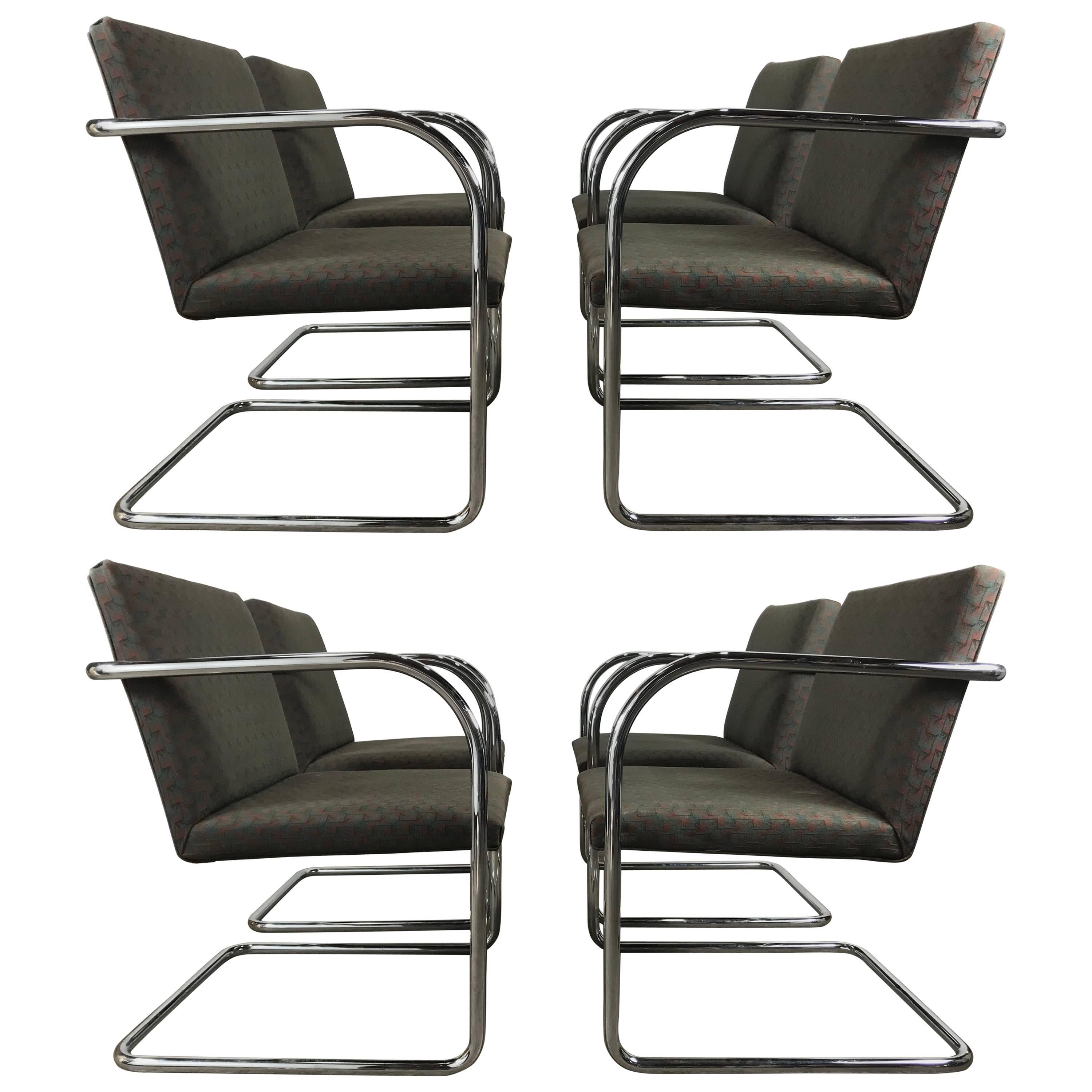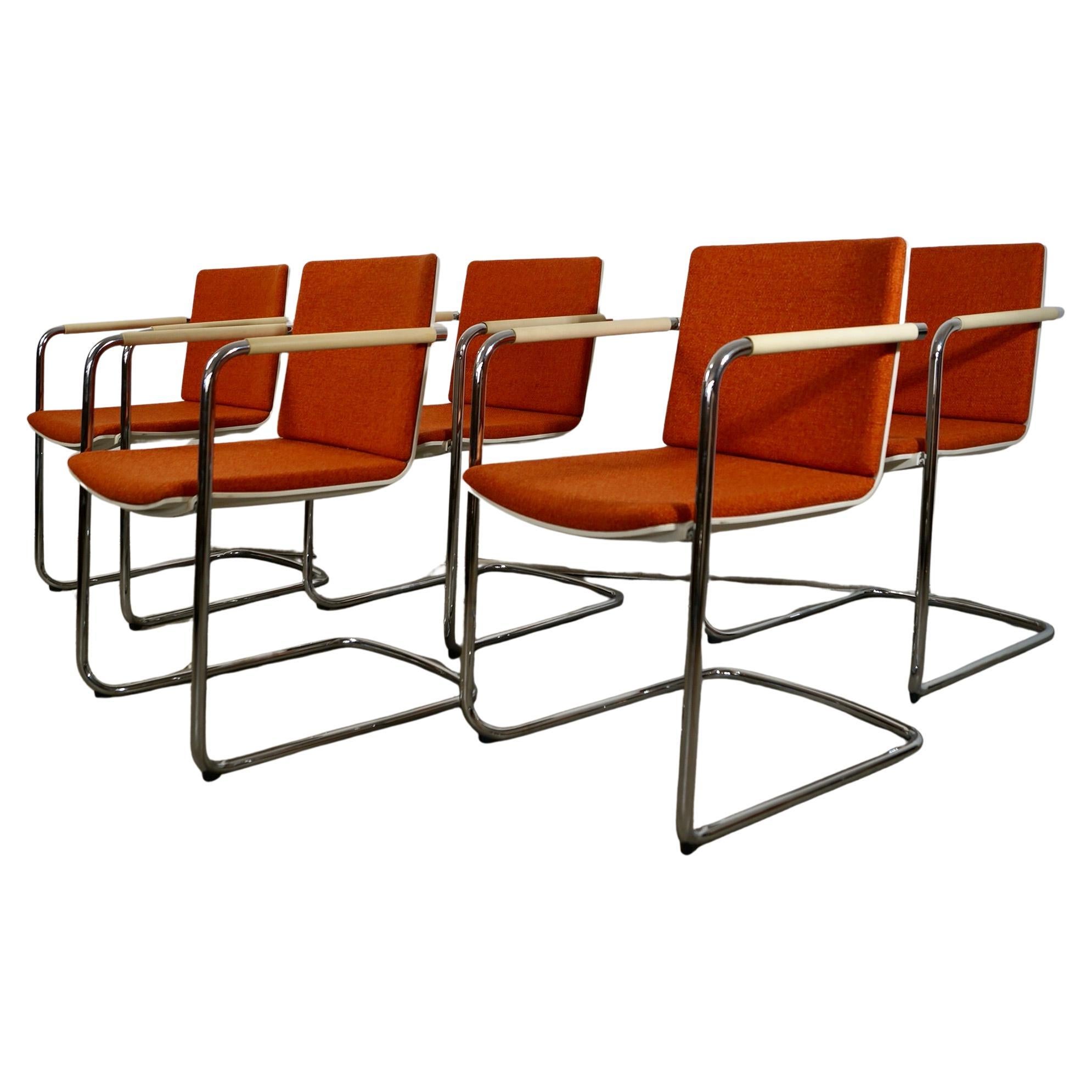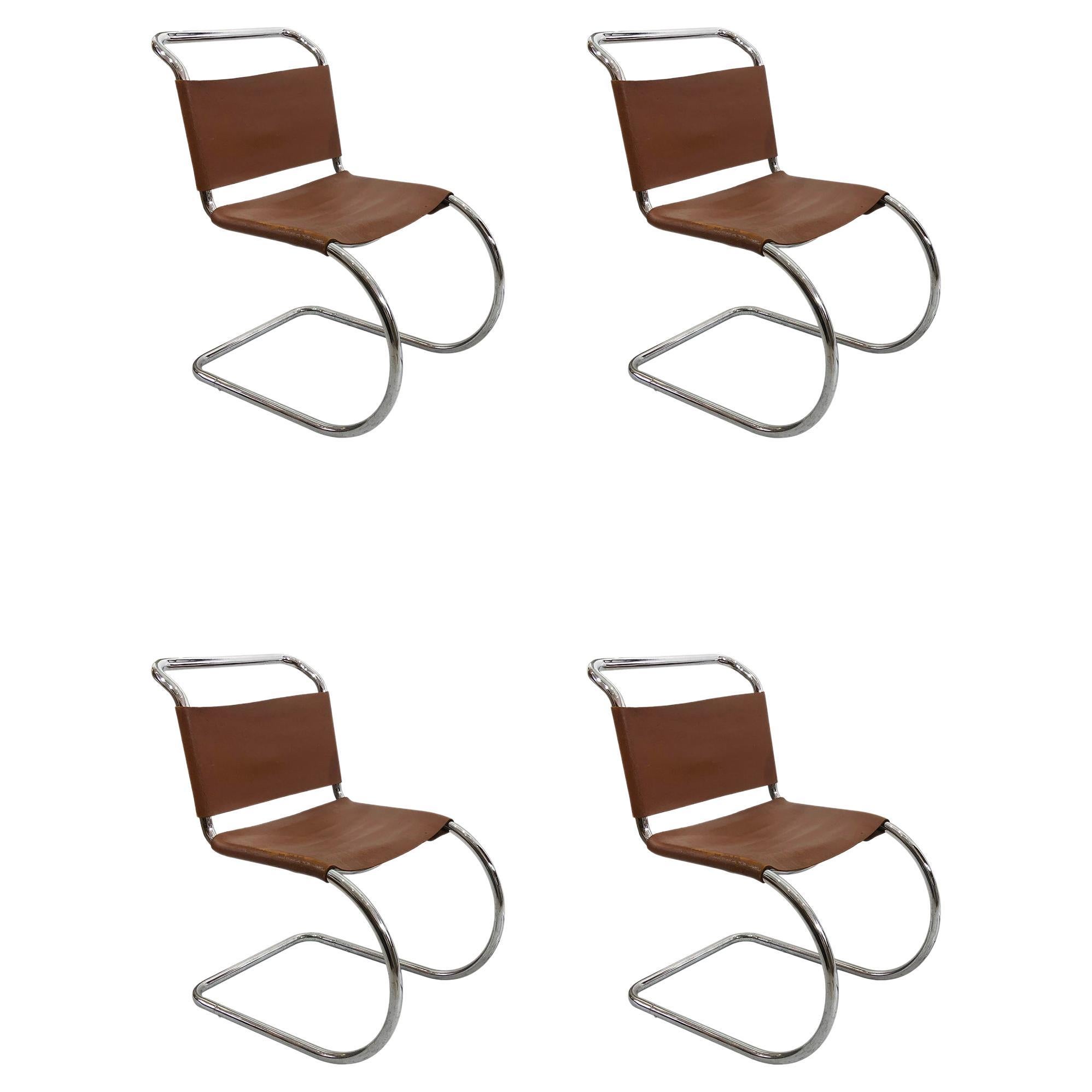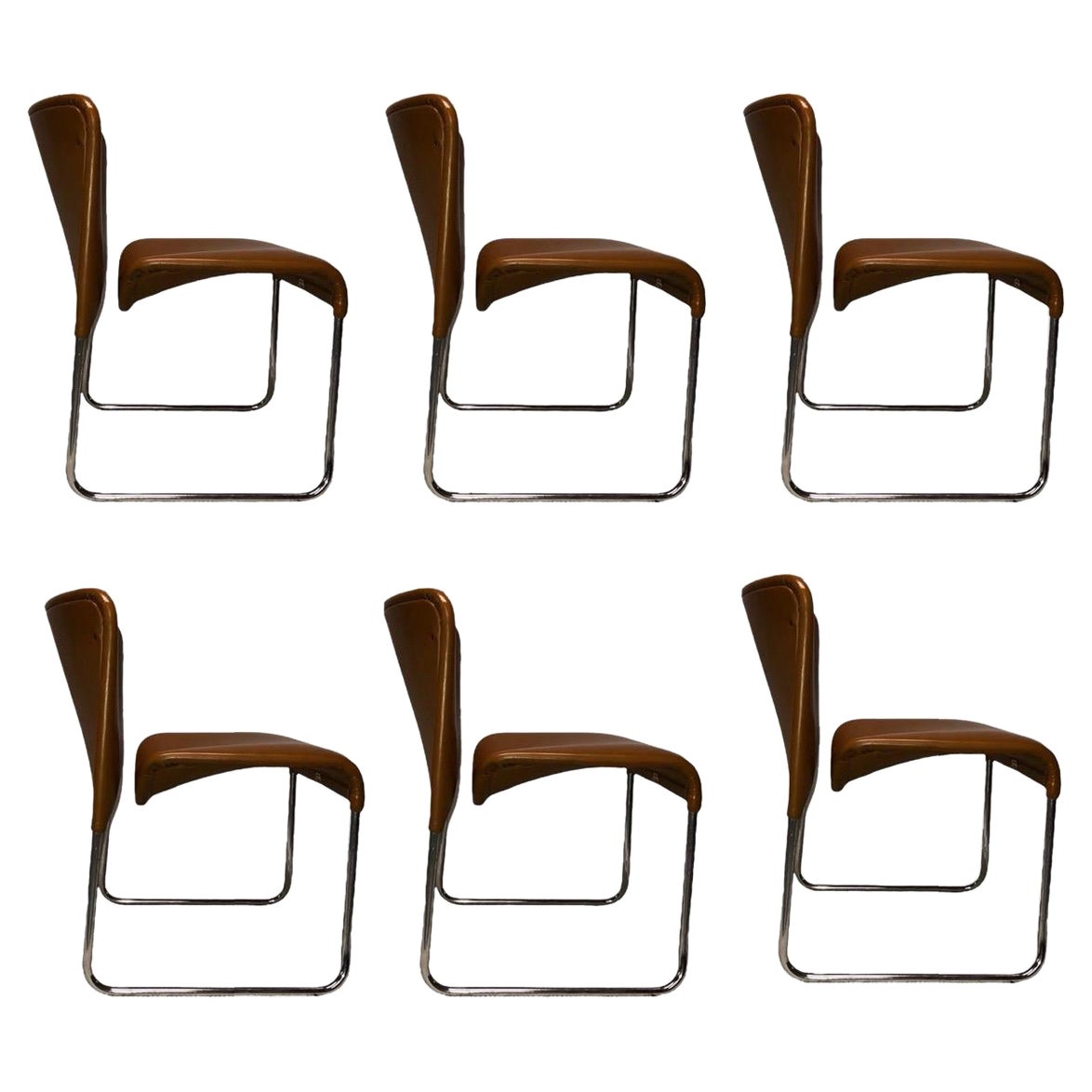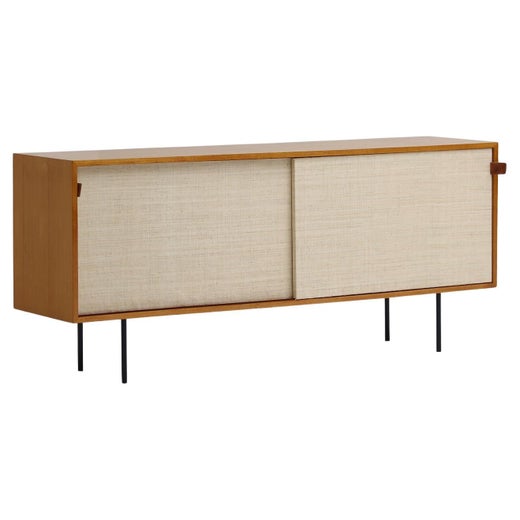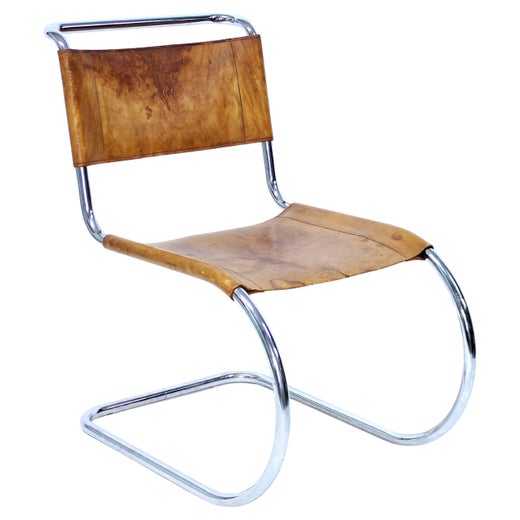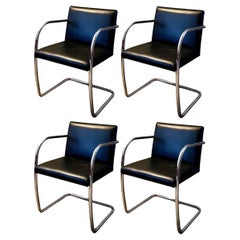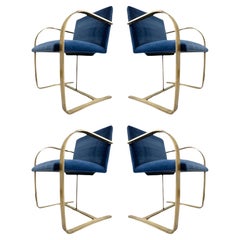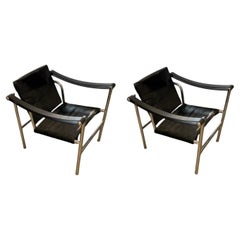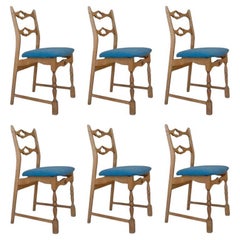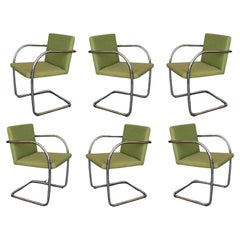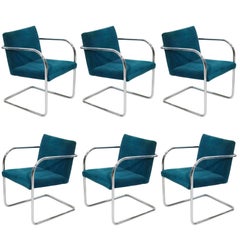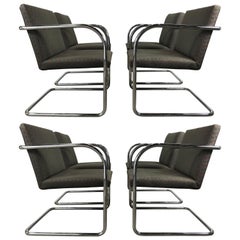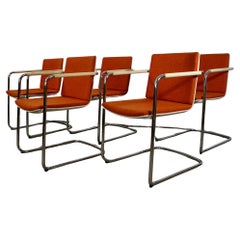(6) Green Velvet Knoll + Thonet Chrome Brno Cantilevered Chairs
About the Item
- Creator:
- Dimensions:Height: 31 in (78.74 cm)Width: 22 in (55.88 cm)Depth: 17 in (43.18 cm)Seat Height: 18 in (45.72 cm)
- Sold As:Set of 6
- Style:Mid-Century Modern (In the Style Of)
- Materials and Techniques:
- Place of Origin:
- Period:
- Date of Manufacture:Circa 1970s
- Condition:Reupholstered. Wear consistent with age and use. Reupholstered in 2019.
- Seller Location:Round Top, TX
- Reference Number:1stDibs: LU9779240825522
Knoll
As a company that produced many of the most famous and iconic furniture designs of the 20th century, Knoll was a chief influence in the rise of modern design in the United States. Led by Florence Knoll, the firm would draw stellar talents such as Ludwig Mies van der Rohe and Eero Saarinen into its compass. Their work would help change the face of the American home and office.
The company was formed in 1938 by the German immigrant Hans Knoll. He first worked with his fellow ex-pat, the Danish designer Jens Risom, who created furniture with flowing lines made of wood. While Risom served in World War II, in 1943 Knoll met his future wife, Florence Schust. She had studied and worked with eminent emigré leaders of the Bauhaus, including Mies, Walter Gropius and Marcel Breuer. She won Knoll over with Bauhaus notions of industrial arts, and an aesthetic that featured flat and tubular metal frames and angular forms. When Hans died in a car crash in 1955, Florence Knoll was appointed head of the company. It was as much through her holistic approach to design — a core division of the firm was dedicated to planning office systems — as Knoll's mid-century modern furnishings themselves that she brought about the sleek and efficient transformation of the American workplace.
Today, classic Knoll furnishings remain staples of modern design collections and decor. A history of modern design is written in pieces such as the elegant Barcelona chair — created by Mies and Lilly Reich — Saarinen’s pedestal Tulip chair, Breuer’s tubular steel Wassily lounge chair and the grid-patterned Diamond chair by Harry Bertoia.
As you can see from the collection of these designs and other vintage Knoll dining chairs, sofas and tables on 1stDibs, this manufacturer's offerings have become timeless emblems of the progressive spirit and sleek sophistication of the best of modernism.
Thonet
For more than 180 years, Thonet — or Gebrüder Thonet — has produced elegant and durable tables and cabinets as well as chairs, stools and other seating that wholly blur the lines between art and design. Widely known as a trailblazer in the use of bentwood in furniture, the European manufacturer has reimagined the places in which we gather.
Noted for his skill in parquetry, German-Austrian company founder Michael Thonet received an invitation from Austrian Chancellor Prince Metternich to contribute Neo-Rococo interiors to the Liechtenstein City Palace in Vienna. The Boppard-born Thonet had honed his carpentry skills in his father’s workshop, where he carried out experiments with plywood and modified the Biedermeier chairs that populated the studio.
Thonet’s work for the chancellor raised his profile, and the cabinetmaker gained international recognition, including at London’s Great Exhibition of 1851, which featured works created by members of the Arts and Crafts movement as well as industrial products of the day. Thonet showed a range of furniture at the fair and won the bronze medal for his bentwood chairs. He incorporated his family’s company, the Thonet Brothers, with his sons in 1853.
Bentwood furniture dates as far back as the Middle Ages, but it is the 19th-century cabinetmaker Thonet who is most often associated with this now-classic technique. Thonet in 1856 patented a method for bending solid wood through the use of steam, and from there, the bentwood look skyrocketed to furniture fame. The works of renowned mid-century modern designers such as Alvar Aalto, Arne Jacobsen, and Charles and Ray Eames that put this technological advancement to use would not be as extensive or celebrated were it not for the efforts of the pioneering Thonet.
Considered the world’s oldest mass-produced chair, Michael Thonet’s ubiquitous Chair No. 14 demonstrated that his patented bentwood technology made it possible to efficiently produce furniture on an industrial scale. Now known as the 214, it won the German Sustainability Award Design for 2021, a recognition of the company’s commitment to environmentally responsible production.
Often called the Coffee House chair — the company’s first substantial order was for a Viennese coffeehouse — the No. 14 remains an icon. Thonet originally designed the chair in 1859, and it is considered the starting point for modern furniture.
The bentwood process opened doors — there were investments in machinery and new industrial processes, and the business began mass-producing furniture. By the end of the 1850s, there were additional Thonet workshops in Eastern Europe and hundreds of employees. Michael Thonet’s reputation attracted the attention of notable architects including Otto Wagner, Marcel Breuer and Ludwig Mies van der Rohe.
The No. 14 was followed by the No. 18, or the Bistro chair, in 1867, and the 209, or the Architect’s chair, of which Le Corbusier was a fan. (The influential Swiss-French architect and designer used Thonet furniture in his Pavillon de l’Esprit Nouveau at the 1925 International Exposition of Decorative Arts in Paris.)
Thonet’s chair designs also appeared in artwork by Toulouse-Lautrec, John Sloan and Henri Matisse in his Interior with a Violin Case. The noteworthy Thonet rocking chair remains a marvel of construction — in the middle of the 19th century, Michael produced a series of rockers in which the different curved parts were integrated into fluid, sinuous wholes. Thanks to Thonet, the humble rocker acquired something unexpected: style. It was captured in the paintings of Pablo Picasso, Pierre-Auguste Renoir and James Tissot.
Thonet is currently split into global divisions. Thonet Industries U.S.A. was acquired in 1987 by Shelby Williams and joined the CF Group in 1999, while the Thonet brand in Germany is owned by Thonet GmbH.
Find a collection of antique Thonet furniture on 1stDibs.

- ShippingRetrieving quote...Shipping from: Allen, TX
- Return Policy
More From This Seller
View AllLate 20th Century American Mid-Century Modern Chairs
Chrome
Mid-20th Century North American Mid-Century Modern Armchairs
Brass
Late 20th Century Italian International Style Lounge Chairs
Steel, Chrome
Mid-20th Century Danish Brutalist Dining Room Chairs
Textile, Oak
Mid-20th Century Brazilian Mid-Century Modern Chairs
Leather, Imbuia
Early 2000s Danish Scandinavian Modern Office Chairs and Desk Chairs
Steel, Chrome
You May Also Like
Mid-20th Century European Mid-Century Modern Dining Room Chairs
Chrome
Vintage 1970s American Mid-Century Modern Dining Room Chairs
Chrome
1990s American Bauhaus Armchairs
Chrome
2010s German Bauhaus Armchairs
Chrome
Vintage 1960s American Mid-Century Modern Dining Room Chairs
Steel, Chrome
Vintage 1970s Italian Mid-Century Modern Dining Room Chairs
Chrome
